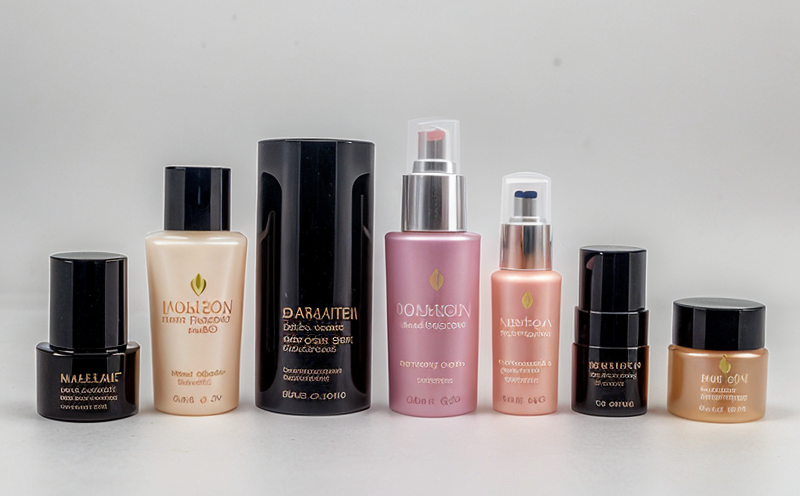Gasket Material Compatibility Testing in Cosmetics
When developing cosmetic products, ensuring the compatibility of gasket materials with their packaging is crucial. Gaskets play a vital role in sealing containers and preventing leaks or contamination, thus maintaining product integrity and safety. This service focuses on identifying potential issues related to material interactions that could compromise the quality and shelf life of cosmetics.
Materials used for gaskets must be carefully chosen to ensure they do not interact unfavorably with the cosmetic contents. Such interactions can lead to off-flavors, colors, or changes in texture, ultimately affecting consumer satisfaction and product safety. Testing is essential to determine whether a given gasket material will undergo undesirable chemical reactions when in contact with specific ingredients like preservatives, antioxidants, emulsifiers, and fragrances.
The process involves subjecting the gasket material to prolonged exposure conditions that mimic real-world scenarios. These can include high humidity levels, temperature variations, and direct contact with different types of cosmetic formulations. By doing so, we assess whether there are any adverse effects on the packaging's integrity or if the chemical composition of the product is altered in a way that could pose risks.
One key aspect of this testing involves examining migration rates and limits for specific substances from the gasket into the cosmetic product. Migration refers to the transfer of chemicals from one medium to another, which can be particularly concerning if it results in the presence of harmful compounds above acceptable limits set by regulatory bodies like the European Union (EU) Cosmetics Regulation or the US Food and Drug Administration (FDA).
- Chemical Migrations: This includes evaluating the release of solvents, plasticizers, antioxidants, and other additives used in gasket materials. These chemicals may migrate into the cosmetic product over time due to prolonged contact.
- Bacterial Contamination: Testing for potential bacterial growth caused by compromised seals or leaks is another critical factor. Ensuring that no pathogens can enter through improperly sealed containers is paramount, especially in products intended for frequent use and direct application on the skin.
- Color Changes: Some interactions between gasket materials and cosmetic contents result in visible changes to the product's appearance. This could range from slight discoloration to significant alterations that impact both aesthetic appeal and consumer trust.
The testing protocol adheres strictly to international standards such as ISO 15238, which provides guidelines for assessing migration from packaging into food products, and IEC 60742-2, which covers similar principles but tailored towards non-electrical applications. Compliance with these standards not only ensures product safety but also facilitates market entry in various regions around the world.
Our laboratory employs advanced analytical techniques like gas chromatography-mass spectrometry (GC-MS), liquid chromatography-tandem mass spectrometry (LC-MS/MS), and Fourier transform infrared spectroscopy (FTIR) to accurately measure trace amounts of migrating compounds. Additionally, we utilize accelerated stability studies to predict long-term performance under various environmental conditions.
Through rigorous testing procedures, our team aims to provide manufacturers with comprehensive data regarding the compatibility of their chosen gasket materials. This information helps them make informed decisions about material selection and formulation adjustments necessary for achieving optimal product quality and safety standards. Ultimately, this service supports the broader goals of enhancing consumer trust in cosmetic products while adhering to stringent regulatory requirements.
Quality and Reliability Assurance
The reliability of our testing services is paramount to ensuring consistent quality in cosmetics. Our laboratory adheres strictly to ISO/IEC 17025 accreditation standards, which guarantee that all procedures are conducted under controlled conditions and meet the highest scientific rigor.
To maintain this level of assurance, we employ a team of experienced professionals who specialize in material science, analytical chemistry, and packaging engineering. Each member contributes their expertise to ensure comprehensive evaluation across multiple dimensions of gasket compatibility.
Our commitment to quality extends beyond mere compliance with regulatory standards. By leveraging cutting-edge technologies and methodologies, we continuously strive for excellence in every aspect of our operations. This approach ensures that customers receive reliable insights into the performance characteristics of their chosen materials under various scenarios.
International Acceptance and Recognition
The international acceptance of our testing services is a direct reflection of our commitment to delivering accurate, reproducible results. Our laboratory has earned recognition from regulatory bodies worldwide for its expertise in packaging and material compatibility assessments.
Compliance with ISO/IEC 17025 accreditation standards provides assurance that our methodologies are robust and reliable. This certification is widely respected across Europe, North America, Asia-Pacific regions, and beyond. Regulatory acceptance by the EU Cosmetics Regulation and FDA guidelines further strengthens our position as a trusted partner in ensuring product safety and quality.
Our reputation for delivering high-quality data has earned us partnerships with leading companies within the cosmetic industry. By partnering with these organizations, we contribute to innovation while upholding strict standards of integrity and transparency throughout each project.
Environmental and Sustainability Contributions
In addition to supporting product safety and quality, our testing services also play a significant role in promoting environmental sustainability. By identifying materials that are less prone to interactions with cosmetic contents, we help reduce waste generation associated with compromised packaging.
The use of gasket materials that exhibit excellent resistance to chemical breakdowns reduces the likelihood of premature degradation, extending product shelf life and minimizing disposal needs. This aligns closely with broader sustainability goals aimed at reducing environmental impact while maintaining high standards of quality.
Through our testing services, we contribute positively towards achieving sustainable practices within the cosmetic industry by fostering innovation that balances performance requirements with ecological considerations. Our ongoing efforts focus on developing greener alternatives and promoting circular economy principles wherever possible.





